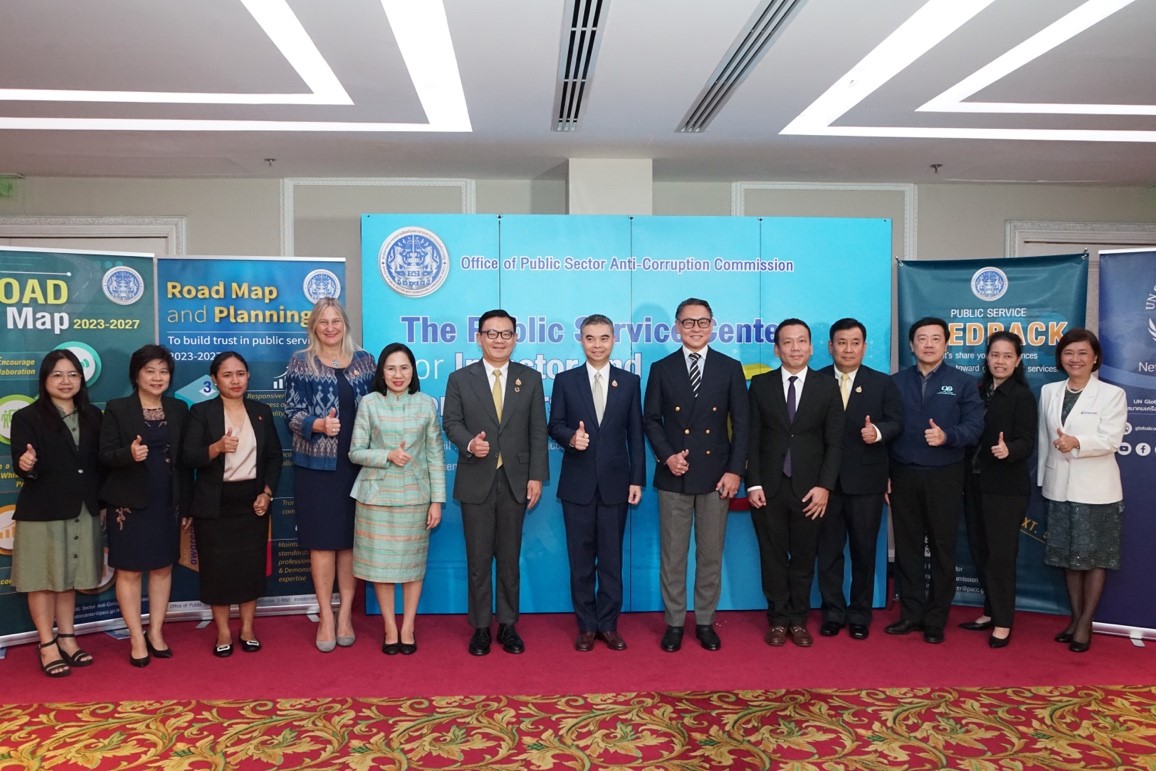
26 กรกฎาคม 2567 สมาคมเครือข่ายโกลบอลคอมแพ็กแห่งประเทศไทย (United Nations Global Compact Network Thailand, UNGCNT) ร่วมจัดพิธีลงนามบันทึกข้อตกลงความร่วมมือ (MOU) ว่าด้วยการยกระดับการส่งเสริมภาคเอกชนในการแก้ไขปัญหาการทุจริตคอร์รัปชัน กับ สำนักงานคณะกรรมการป้องกันและปราบปรามการทุจริตในภาครัฐ และสมาคมส่งเสริมสถาบันกรรมการบริษัทไทย (IOD) เพื่อเสริมสร้างศักยภาพภาคเอกชน พัฒนานโยบายและมาตรการการป้องกันและต่อต้านการทุจริต พร้อมด้วยกิจกรรมสร้างการรับรู้ต่อการขับเคลื่อน เพื่อร่วมกันยกระดับค่าคะแนนดัชนีการรับรู้การทุจริต (Corruption Perceptions Index : CPI) ของประเทศไทย ณ โรงแรมแมนดาริน กรุงเทพฯ โดยมีผู้แทนภาครัฐ ภาคเอกชน สถาบันการศึกษา เข้าร่วมกว่า 80 คน

ดร.เนติธร ประดิษฐ์สาร เลขาธิการสมาคมเครือข่ายโกลบอลคอมแพ็กแห่งประเทศไทย (UN Global Compact Network Thailand: UNGCNT) และผู้ช่วยบริหาร ประธานคณะผู้บริหาร และรองกรรมการผู้จัดการอาวุโส สำนักความร่วมมือระหว่างประเทศด้านความยั่งยืนและสื่อสารองค์กร บริษัท เครือเจริญโภคภัณฑ์ จำกัด ให้เกียรติร่วมเปิดงาน และ กล่าวปาฐกถาพิเศษ เรื่อง การยกระดับกระบวนการอนุมัติอนุญาตเพื่อส่งเสริมการป้องกันและปราบปรามการทุจริต: ข้อค้นพบจากการศึกษา
ดร. เนติธร ย้ำว่า การต่อต้านการทุจริตเป็นเรื่องของทุกฝ่าย และภาคเอกชนต้องผนึกกำลังร่วมกับภาครัฐ ด้วยบทบาทเชิงรุกในการแก้ปัญหาการทุจริตคอร์รัปชั่น เพิ่มความโปร่งใส ซึ่งจะช่วยส่งเสริมให้ธุรกิจไทยเติบโตอย่างยั่งยืน พร้อมเสนอ 3 แนวทางในการป้องกันและจัดการความเสี่ยงในกระบวนการดำเนินธุรกิจที่อาจสร้างโอกาสในการทุจริต ดังนี้ 1) นำเทคโนโลยีดิจิทัล (digitalization) มาใช้ในการอนุมัติ อนุญาต และตรวจสอบ ติดตามผล เพื่อให้กระบวนการรวดเร็วขึ้น โดยกำหนดตัวชี้วัดผลการดำเนินงาน (KPI) และเป้าหมายในการนำเทคโนโลยีมาใช้อย่างเป็นรูปธรรม และวัดผลได้ ซึ่งเป็นเรื่องที่ คุณศุภชัย เจียรวนนท์ นายกสมาคมเครือข่ายโกลบอลคอมแพ็กแห่งประเทศไทย ให้ความสำคัญและขับเคลื่อนในประเด็นนี้มาอย่างต่อเนื่อง 2) ทบทวนกฎระเบียบเพื่อขจัดขั้นตอนที่ซ้ำซ้อนหรือใช้ดุลยพินิจ เพื่อลดโอกาสในการใช้อำนาจในทางที่ไม่ชอบและการทุจริต และ 3.การปฏิรูปกระบวนการอนุมัติ อนุญาต ที่คำนึงถึงผู้ใช้เป็นศูนย์กลาง (user-centric design) และแบบอิงความเสี่ยง (risk-based licensing) โดยพิจารณาปัจจัยแวดล้อม อาทิ ประเภทอุตสาหกรรม ผลกระทบต่อสิ่งแวดล้อม สุขภาพและความปลอดภัยของประชาชน ความมั่นคงทางการเงินของธุรกิจ และประวัติการปฏิบัติตามกฎระเบียบของผู้ประกอบการ เป็นต้น
ดร.เนติธร กล่าวทิ้งท้ายไว้ว่า “พลังและความร่วมมือของทุกฝ่าย จะสามารถปิดช่องว่าง ลดโอกาส และความเสี่ยงการทุจริต สร้างสภาพแวดล้อมในการแข่งขันที่เป็นธรรม ซึ่งจะส่งเสริมให้ธุรกิจเติบโตอย่างยั่งยืนและรับผิดชอบ”

CP Group Collaborates to Combat Corruption, Boost Transparency, and Foster Sustainable Growth in Thai Businesses
On July 26, 2024, the United Nations Global Compact Network Thailand (UNGCNT) co-organized a signing ceremony for a Memorandum of Understanding (MoU) on enhancing the private sector’s role in addressing corruption. This event, held at the Mandarin Hotel in Bangkok, was in collaboration with the Office of Public Sector Anti-Corruption Commission (PACC) and Thai Institute of Directors (IOD). The Memorandum of Understanding aims to empower and involve the private sector in developing policies and measures to prevent and combat corruption, with the goal of improving Thailand’s Corruption Perceptions Index (CPI) score. The ceremony was attended by over 80 representatives from the government, private sector, and educational institutions.
Dr. Netithorn Praditsarn, Secretary-General of UNGCNT, and Executive Assistant to Group CEO and Senior Vice President of the Office of Global Partnership, Sustainability and Communications at Charoen Pokphand Group Co., Ltd., delivered a special talk on improving approval processes to prevent corruption, sharing insights from UNGCNT’s report.
Dr. Netithorn emphasized that combating corruption requires collective efforts from all sectors, particularly the private sector which must take a proactive role in addressing corruption and enhancing transparency to support the sustainable growth of Thai businesses. He proposed three key approaches to prevent and manage corruption risks in the approval process for business operations:
- Digitalization of the Approval Process: implement a digitalized approval system with robust tracking and monitoring to streamline procedures. Set clear and measurable Key Performance Indicators (KPIs) to evaluate the effectiveness of the digitalization. This initiative, strongly advocated by Mr. Suphachai Chearavanont, President of UNGCNT, aims to enhance efficiency and transparency.
- Regulatory Review: Eliminate redundant or discretionary steps in regulations to minimize opportunities for abuse of power and corruption.
- Reform approval processes: develop user-centric and risk-based licensing processes, considering factors such as industry types, environmental impacts, public health and safety, business financial stability, and compliance history.
Dr. Netithorn concluded by stating, “the collective power and cooperation of all parties can close gaps, reduce opportunities for and risks of corruption, and create a fair competitive environment, thereby promoting sustainable and responsible business growth.”

